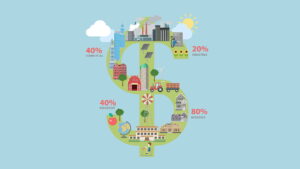Capitalism is the economic system that has influenced a large portion of the modern world. It is predicated on competition, profit-seeking, and private resource ownership. Although Capitalism has boosted economic expansion, sparked innovation, and raised millions of people’s standards of living, it also has serious negative effects, especially on environmental sustainability. The question of whether this system can be altered to accommodate a habitable future or if it is fundamentally unsustainable emerges in light of climate change.
Furthermore, there has always been a debate about the impact of businesses and materialistic aspects on the environment. Since now the world is confronting serious environmental issues, there are more questions to arise with the need of practical solutions.
In tackling climate change, the viability of Capitalism is a complex and controversial topic. Due to unrestricted industrial expansion and a greedy demand for resources, Capitalism, an economic system based on constant growth and profit maximization, has historically made environmental degradation worse.
Although supporters point to its innovative potential, which is validated by innovations like sustainable farming practices and renewable energy technologies, these developments frequently function within the constraints of market-driven essentials that put profitability before comprehensive ecological restoration. Furthermore, systemic problems like corporate lobbying, consumer injustice, and greenwashing highlight the fundamental tensions between the profit-driven goals of this system and the pressing need for fair climate action.
Nonetheless, Global collaboration, revolutionary policy changes, and a fundamental reinterpretation of economic success that prioritizes social justice and ecological balance are all necessary for Capitalism to transition into a sustainable framework. Without such pattern changes, Capitalism runs the risk of continuing on its current course toward environmental collapse, making it unsustainable in the face of a worsening climate disaster. If the world is prioritizing profit intensification without considering long-term and short-term consequences, sooner or later it will confront uncontrollable and unbearable consequences.
What is the Contribution of Capitalism to Climate Change?

There is a clear connection between climate change and Capitalism. Growth, earnings, and competition are the main focuses of the capitalist economic system. Businesses frequently use natural resources like forests, land, and fossil fuels to accomplish these objectives. Environmental issues like pollution, deforestation, and greenhouse gas emissions, the primary causes of climate change, have been directly brought on by this exploitation.
In this system, the emphasis on generating profits can occasionally cause businesses to overlook the effects of their processes on the environment. For instance, to save money, businesses may decide to use less expensive but environmentally harmful energy sources like coal or oil.
However, Capitalism also promotes development. As a result, green technologies that can help fight climate change have emerged, such as electric vehicles and solar electricity. These solutions might not always be available to everyone, though, and they frequently take time to propagate.

Capitalism has worsened climate change by putting profit ahead of the environment, but it also has the power to shoot solutions, that is, if it can strike a balance between sustainability and growth.
Consider a clothing factory as a hypothetical instance. The primary objective of a factory operating under capitalism is to maximize profits by producing the greatest number of garments at the lowest possible cost. Cheap materials and energy sources like coal, which pollutes the air and fuels climate change, may be used to achieve this. Additionally, factories may produce a lot of trash, such as unused fabric and dyes, which are bad for the environment.
Now, a factory under capitalism could lessen its environmental impact if it chooses to use renewable energy and sustainable materials. However, these adjustments may be more expensive, and if sustainable products are not demanded by consumers or mandated by law, the business may choose to give up them under capitalism.
This reveals how capitalism, depending on the goals of corporations, customers, and governments, might both negatively impact the environment and possibly provide remedies.
Growth is essential to Capitalism; markets change, industry flourishes, and consumption rises. But the environment has frequently suffered as a result of this expansion. The foundation of industrialization has been fossil fuels, deforestation, and unsustainable farming methods, which have resulted in greenhouse gas emissions and environmental deterioration. Critics contend that the system encourages short-term gains over long-term sustainability and puts profits ahead of the environment.
At the same time, technological advancements like carbon capture and renewable energy sources have been spurred by Capitalism. These developments imply that, with the correct incentives and regulations in place, the system may contribute to climate change alleviation.
Furthermore, Sustainability is a priority for many Capitalism firms, but in practice, this is frequently not the case. Greenwashing, the practice of businesses inflating or falsifying their environmental initiatives, has grown to be a serious problem. While some companies make investments in environmentally friendly operations, others use empty efforts that have little effect on real emissions or ecological restoration to erode consumer confidence.
This brings up a crucial issue: can we trust Capitalism enterprises to the forefront of the battle against climate change? Real environmental intentions are often overshadowed by profit incentives in the absence of strong legislation and open reporting.
The Influence of Consumption

Under Capitalism, consumers hold enormous power. Production patterns are frequently determined by market demand, therefore consumers may influence change by selecting sustainable goods and methods. As an illustration of the impact of conscious consumption, consider the rising demand for organic foods, electric cars, and zero-waste items.
But there are drawbacks to this strategy. Individual decisions alone cannot bring about systemic change, and not everyone can afford eco-friendly alternatives. For sustainable choices to be available and affordable for everyone, governments and businesses must collaborate.
Regulation and Policy Interventions
Strong policy frameworks are necessary for Capitalism to be consistent with climate objectives. Stricter emission laws, carbon fees, and renewable energy subsidies are among the strategies to incentivize companies to hold sustainable practices. Global accords such as the Paris Accord show how economies can be pushed toward more environmentally friendly paths through collective action.
The difficulty is striking a balance between environmental preservation and economic prosperity. Some contend that because corporations oppose laws that risk their earnings, Capitalism is inherently resistant to regulation. Others think that if countries and international organizations impose strict environmental regulations, Capitalism can adjust.
Is It Possible for Capitalism to Innovate?

The capacity for innovation is one of Capitalism’s advantages. Both new and established businesses are making investments in environmentally friendly technologies, such as solar energy and plant-based meat substitutes.
Climate change has been both helped and delayed by Capitalism. Its capacity to spur economic expansion and innovation is undeniable, but its weight on growth and profits frequently comes at the expense of the environment.
Systemic changes are required if Capitalism is to remain worthwhile in the face of climate change. Governments, businesses, and consumers must work together to reinterpret what “progress” means in the twenty-first century, and policies must match financial incentives with environmental demands. The future of Capitalism, humanity, and the earth will all depend on its ability to adjust to these difficulties.













